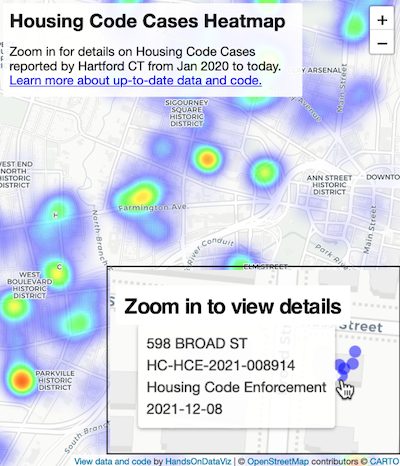Housing Code Cases Map Collaboration by Trinity and Hartford Partners
At Trinity, the Community Learning program extends the boundaries of the classroom into the Hartford community by engaging students and faculty in research and creative projects that both deepen student learning and advance the goals of our community partners. This spring, we have two teams of student researchers diving into Hartford housing issues with a particular focus on landlords and tenants. On the first team, Community Learning Research Fellows Jane Dunbar ‘23 and Sulemaan Khalid ‘23 are working with faculty sponsor Laura Delgado to explore ownership of Hartford apartment buildings and housing code complaints with their partners at the Hartford Land Bank. On the second team, Community Action Gateway students James Maciel Andrews ‘25, Myri Ayala ‘25, Anna Grant-Bolton ‘25, and Jack White ‘25 are exploring tenants’ perspectives on the process of housing code complaints filed with City investigators with their partners at the Center for Leadership & Justice.
Together, both teams of student researchers and their partners faced an obstacle. Although the City of Hartford publicly shares data on tenants’ complaints or inspectors’ findings about housing code violations, this information was not automatically displayed in an easy-to-read map. Furthermore, whenever students downloaded and geocoded this data to create a map for community partners, their work soon became outdated after the semester ended.
One solution was to create an online map with continuously-updated data. Both teams of Trinity students collaborated with Professor Jack Dougherty and Ilya Ilyankou ‘18 to launch the Housing Code Complaints Heatmap, which automatically displays information from the City of Hartford’s Open Data repository. When zoomed out, the heat map shows large clusters of housing code complaints with orange-to-red colors. When zoomed in, the map allows users to identify specific apartment addresses and the date and type of complaint filed. Ilyankou and Dougherty designed this map based on principles featured in their new book, Hands-On Data Visualization: Interactive Storytelling from Spreadsheets to Code (O’Reilly Media, 2021), which they also made freely available as an open-access online book.

This heatmap provides a valuable bird’s-eye view on the current status of code complaints for Hartford city officials and housing advocates. When we previewed this map with several Hartford community partners, they responded with these comments:
This geographical visual tool is a superior resource to the City of Hartford code enforcement departments, and the communities we serve, in identifying further those areas in need of housing quality improvement and resources.
This data map is so important because it tells a story about those who live in substandard housing in our city. As a resident of Hartford it is disheartening to see how many landlords have been repeat offenders of housing code violations, callously profiting while our residents suffer. As head of the Hartford Land Bank, this work helps inform our long-term strategy to help rebuild communities where all residents have the basic dignity of decent housing.
This map will be incredibly helpful for organizers to decide which buildings to target to talk to tenants and to show tenants what’s happening in their building and across the city.
We extend a special thanks to Ilya Ilyankou ‘18 for creating this visualization, to the City of Hartford for providing the necessary data sets through the Open Data repository, and to Trinity students Jane Dunbar ‘23, Sulemaan Khalid ‘23, James Maciel Andrews ‘25, Myri Ayala ‘25, Anna Grant-Bolton ‘25, and Jack White ‘25 for liaising with community partners to identify their goals and the most useful communications product we could create.
At Trinity we define Community Learning courses as those that include perspective taking and mutually beneficial relationships with community partners. If you are a faculty member interested in building a Community Learning component into your course, or you believe your course should be designated as a Community Learning course; or, if you are a Hartford community organization that is interested in partnering with Trinity, contact Director of Community Learning [email protected].
See more about EDUC 206 Data Visualization for All here.
See more about the Community Learning Research Fellows program here.
See more about the Spring 2022 Community Action Gateway here.
See the City of Hartford’s Open Data repository here.
